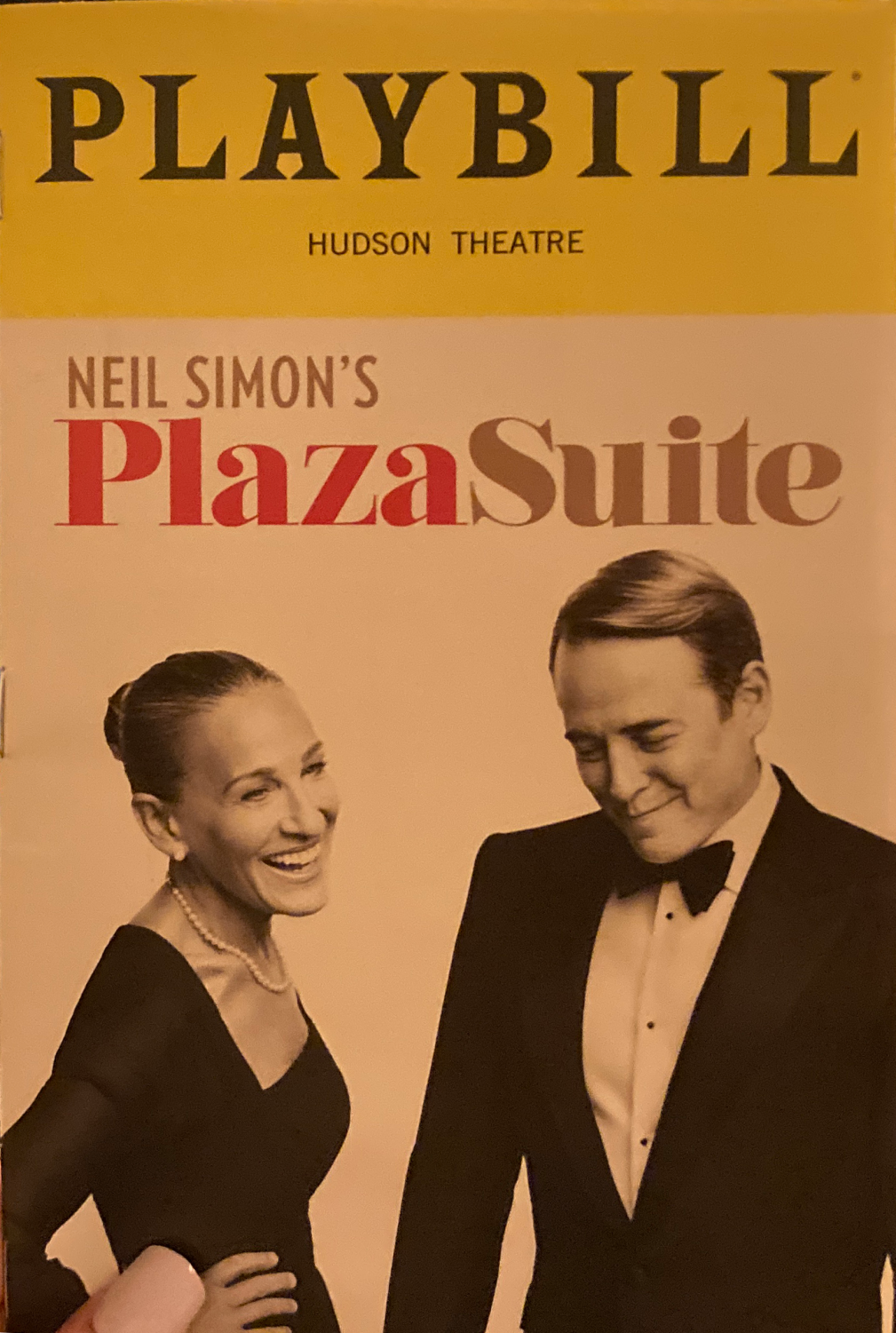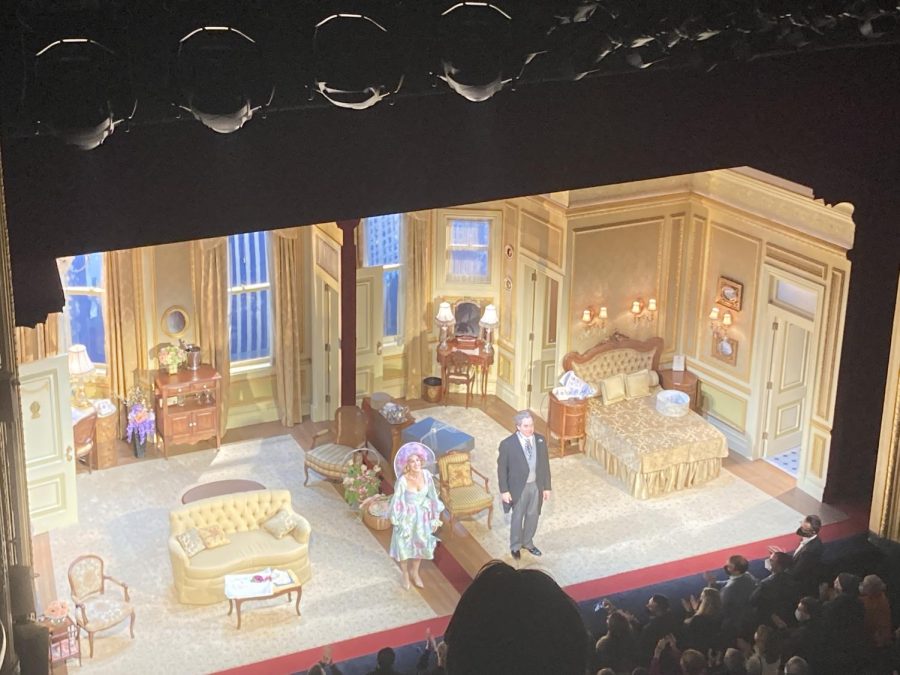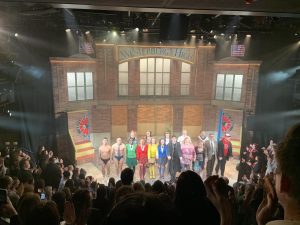Sarah Jessica Parker and Matthew Broderick Take Their Romance to the Stage in ‘Plaza Suite’
The off-screen couple returns to Broadway at the Hudson Theatre in Neil Simon’s 1968 comedy play
“Plaza Suite” is not the first time Sarah Jessica Parker and Matthew Broderick have performed on Broadway together. In 1996, the pair starred in “How to Succeed in Business Without Really Trying.”
March 26, 2022
It was March of 2020 when dynamic acting couple Sarah Jessica Parker and Matthew Broderick were set to debut in Neil Simon’s comedy “Plaza Suite.” Then, a day before previews were set to begin for the play, COVID-19 shut down Broadway shows entirely.
Now, two years later, they are ready to return to Broadway on March 28 for their official opening night.
The play is structured into three acts — all taking place in The Plaza’s Suite 719 — showing three completely different relationships, but each one features characters played by Parker and Broderick.
The set was simple and, for the most part, consistent across all three acts. Suite 719 had a bedroom and a sitting area, with a fake wall separating the two so the audience could see through to both sides.
The consistency is an homage to how The Plaza stands the test of time.
I thought it could have changed a bit more throughout the show, but the consistency is an homage to how The Plaza stands the test of time. The fake wall between the rooms of the suite allowed for the audience to have an omniscient perspective of the entire room, unlike the characters.
The entrances and exits to the stage were straightforward: Some doors led to the bathroom and hallway and the windows looked out on the city skyline — one of which Broderick’s character climbs out of, which provided some comedic relief.
The Hudson Theatre’s ornate decorations paralleled that of the regal setting of the famous hotel. Even the lobby looked like a hotel bar.
Act 1: Visitor From Mamaroneck
In the opening act, the husband-and-wife duo Sam (Broderick) and Karen (Parker), who are visiting from Mamaroneck, are celebrating their wedding anniversary in the city. Despite the expectation that this stay would be celebratory, it was anything but. The conversation felt like the classic married couple banter that you would see on 1960s television. I felt the annoyance of the bickering myself, as if Sam and Karen were my own parents.
The annoyance also came from the plot’s repetitiveness. Maybe part of this was intentional as to genuinely invoke that feeling, but the first act didn’t really have a plot. Sam and Karen take turns going to the door and turning back to argue with their partner, but the conflict doesn’t get more complicated than their failing marriage. The tones change quickly, with humorous remarks transforming into Karen’s yelling pleas for Sam not to leave her.
Some of the jokes were evidently from a different generation, and they didn’t land as well as one might have hoped — unlike Karen’s paper airplane that landed perfectly next to Sam’s head from across the room.
Despite the comedy, I started to pity Karen — love is complicated, especially with a husband like Sam.
There were casual mentions of disordered eating and suicide that might have gotten some more laughs back in the day, but I couldn’t help but cringe as they delivered these lines.
Despite the comedy, I started to pity Karen — love is complicated, especially with a husband like Sam. Parker portrayed the dissonance and internal struggle to either forgive the husband she loves for cheating on her with his secretary or to make him leave their decadeslong marriage. With an affair thrown in the mix, I don’t envy her situation. Just like her, the audience is left not knowing when, or if, Sam will return to Suite 719.
Act 2: Visitor From Hollywood
The second act provided a lightheartedness that lifted the energy from the first act. Muriel (Parker) and Jesse (Broderick), former high school sweethearts, are reuniting at The Plaza to catch up. Jesse is now a big-shot movie producer in Hollywood, and Muriel is living in the suburbs with her husband and kids.
From the moment Broderick slid across the wooden floor on stage in an Austin Powers-like fashion, I could tell this character was a stark contrast from the uptight, workaholic Sam.

Parker’s new character was pretty similar to Karen, but a bit more chaotic. Muriel almost reminded me of Lucille Ball or Carol Burnett with her awkward body language and frazzled energy, which I absolutely loved. In fact, Burnett starred in the 1987 television movie version of “Plaza Suite.”
As Jesse makes his advances toward Muriel, her naive and distracted self doesn’t notice his hand sliding up her leg. It didn’t help that she was entranced by his celebrity and the escape of suburbia that Jesse represented. Her constant giving-in to his pleas to stay felt like a less-consensual version of “Bad Idea” from “Waitress.”
Although it was entertaining to see the back-and-forth played out on stage, I thought the more overt sexual advances could have been reworked to fit a more aware and current audience.
Act 3: Visitor From Forest Hills
The third act introduces Mimsey (Molly Ranson), the daughter of Norma (Parker) and Roy (Broderick), who is unwilling to leave the bathroom of the hotel room to attend her own wedding. This situation adds a conflict to the final act that the other two acts lack.
The visitors from Forest Hills also prey on a very relatable anxiety — that marriage means you’re ending up like your parents. It was clear from the laughs in the room when Mimsey’s greatest fear was revealed that the audience could empathize with it.
It is a 53-year-old time capsule showcasing the societal roles of men and women in the context of these partnerships.
Norma has that same chaotic energy as Karen and Muriel, all of them emblematic of how the media portrayed women at that time.
Not only did the show illustrate in vignettes the complexities of marriage and romantic relationships — or the absence of either — but it also is a 53-year-old time capsule showcasing the societal roles of men and women in the context of these partnerships.
The aged jokes still garnered laughs from the audience members who were older than myself, but I could have done without some of them. Besides the plot point of Jesse’s interest in Muriel from Act 2, none of them were really central to the plot or dynamic of the relationships — they could easily be replaced with different, more current jokes.
Previews began at the Hudson Theatre on West 44th Street on Feb. 25, and shows will continue to run in a limited engagement until June 26.













